Stone countertops in the kitchen - practicality and natural
Kitchen work surfaces must necessarily be aesthetic and practical, wear-resistant and comfortable. However, not all attractive materials are convenient in operation and reliable. Therefore, they choose stone countertops, in which the magnificent appearance is combined with unconditionally high strength indicators. The stone for creating kitchen work surfaces can be artificial or natural - this affects both aesthetics and technical characteristics.
Natural stone
The worktops made of natural stone will always look noble and luxurious.

It is impossible to ignore the natural pattern - the tabletops made of natural stone will always differ from each other, because it is impossible to find two identical plates in nature. The main characteristics of such working surfaces are stability, durability, immunity to wear and mechanical damage.
If we talk about the characteristics in general, then the table top made of stone has the following advantages and disadvantages:
- Thermal resistance, which allows you to place the surface close to the plate;
- Durability, durability - manufacturers claim that the top made of natural stone serves a minimum of 12-17 years, but in practice this material is several times durable (of course, if it is provided with proper care);
- The possibility of easy restoration - the formed scratches are easily repaired by polishing;
- High weight - installation requires the preparation of a base of increased strength (approximately the same strength of the construction requires a countertop made of concrete);
- Installation, cutting the product is better to trust professionals;
- A high price will be a significant disadvantage in the event that the budget for repairs is limited.
- In addition, do not forget that the stone will always be cold in sensation.
Most often, the top of the stone is granite or marble. It is also possible to make kitchen surfaces from onyx, gabbro (frozen magma), quartz.

The color of the product depends on the deposit in which the stone is mined. For example, granite of Karelia and the Urals - greenish-gray or gray-brown, reddish-brown with green impregnations, but in Kazakhstan and on the Adriatic coast more brighter granite is extracted - scarlet, pinkish, purple.
Granite Countertop
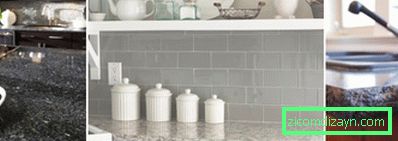
Granite can be a surface with intricate patterns - interspersions of different types, and can look laconic. Depending on the complexity of the picture, the cost of the material also varies.
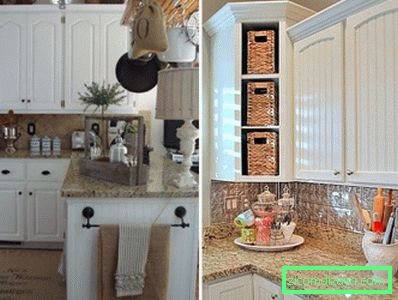
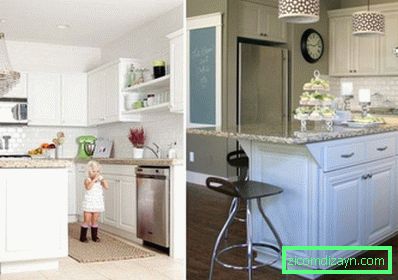
In general, granite is famous for its strength, mirror shine, variety of colors. Very beautiful looks stone surfaces of black color.


He is not afraid of water, nor concentrated household chemicals, nor hot, but the products can be cut without a board. From this stone it is possible to receive perfectly even, smooth table-tops even figured with non-standard edges.

The granite surface perfectly coexists with smooth walls, and with an apron in the form of brickwork.
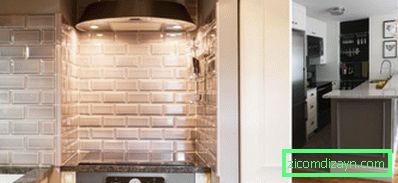
The gray countertop made of this stone can fit in not only in the kitchen of classical and close to it styles, it looks great in modern interiors ().


Marble work top

But the countertops made of natural stone, marble are considered more capricious. The characteristics of the material in this case are:
- Scratch resistance;
- Good polishability;
- Porous structure, because of which the dyeing liquids (wine, coffee) can leave unattractive spots on the surface.
Photos of marble countertops in the traditional classical setting:
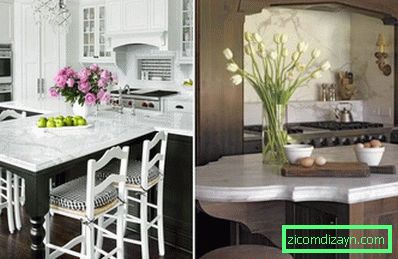

Marble organically looks like in an interior in the style of retro, and in modern modern or Scandinavian design.
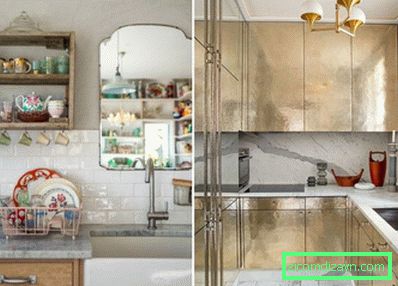

This stone itself is light, so it is often combined with a white kitchen set.
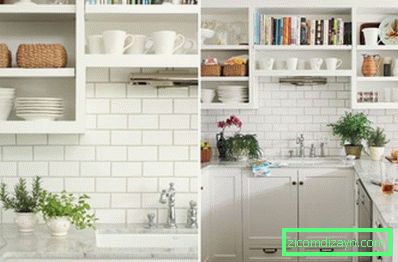
Very effectively, the marble contrasts with the dark furniture.

With which apron it is better to combine such a table top? The best pair in the work area will be an apron of the same marble, tile "boar" (brickwork), white glass.
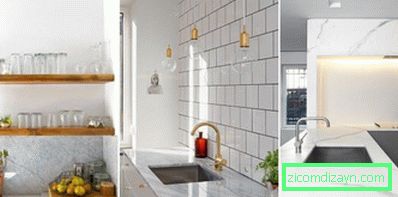
Keep in mind that marble can be of different colors, for example such as the following photos.
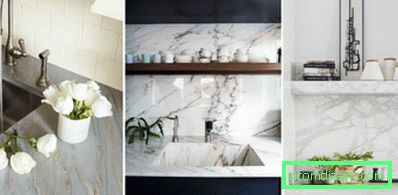
To avoid the appearance of stains, marble must be covered with a special protective agent.
Artificial stone for kitchen countertops

The worktop made of artificial stone is more accessible, much easier and easier to install, and it looks no different from the worktop made of natural stone, but the choice of the color of the surfaces is much broader.
The agglomerate is obtained from a mixture of natural stone and acrylic resins, and then the composition is applied to the plywood base. Agglomerate is absolutely not porous material, which means it is completely water resistant. It is easy to process and can take even the most complex curvilinear form. In such stone tabletops, you can mount in-line washers, which are now in fashion.
Some types of artificial stone are scratched or cracked by strong impacts. But they can be restored without problems, by filling the place with glue and sanding it.
Depending on what technology produces countertops of artificial stone, they are quartzite (agglomerate) or acrylic.
So, the countertop of agglomerate is produced on the basis of quartz crumb, which is subjected to vacuum high-temperature pressing. It also includes pigments that allow the mixture to change the shade. The binder in this case is a polyester resin. It is important that the quartz components here are not less than 90%, and, consequently, the material is no different from the natural stone. Therefore, from the point of view of the ratio of price and practicality to natural marble, it is better to prefer a surface of agglomerate.

Among the advantages of such a countertop of agglomerate:
- Mechanical strength;
- Resistant to high temperatures;
- Color stability.
However, it is impossible to create a seamless seamless surface from such a composite - if there is a need for large areas, then the parts are laid back, as shown in these photos:

Acrylic artificial stone is considered the most budgetary in this segment of materials. Such stone countertops are pigments and mineral fillers in acrylic resin. These surfaces can be joined together with a special glue. Then the joint is polished - this is the way to ensure complete absence of seams. The thermal conductivity of such products is less than that of a natural stone countertop, which means that it will be warm to the touch. In addition, acrylic products are afraid of chipped less than the countertops of agglomerate, but scratching is easier. There is also no resistance to high temperatures - hot dishes can leave traces on this surface, and resistance to acids or acetone. However, the acrylic stone is easily ground with fine sandpaper and polished with GOI paste. But the pollution on such a surface is rare - the structure of the acrylic stone is not porous, and only soapy water will suffice for regular maintenance.
A few recommendations for your choice
Before choosing a work surface, you need to compare the factor "quality-costs". On the countertops for the kitchen of artificial stone, the price directly depends on the thickness of the facing layer. Actually, the thickness affects only one operational factor - the possibility of repeated polishing. It is interesting that the agglomerate, which is the closest to the natural stone by properties, is cheaper than acrylic.
The most stylish kitchen countertops of artificial stone - saturated dark shades (asphalt, graphite, chocolate). However, on these planes (especially if they are glossy) all the scratches are clearly visible. Such shortcomings are deprived of light products - light gray, coffee, cream. By the way, the palette of acrylic products is much wider.
In addition, acrylics are made from countertops of the most complex shapes, but from agglomerate it will not always work.
In the modern kitchen, the countertop made of concrete will also be acceptable - it can be polished "under a stone", turned into granite or tiled.

How to perform surface mounting
Stone countertops are usually expensive, heavy and difficult to install with their own hands. Therefore, it is best to entrust its installation to professionals. To prevent the product from cracking due to internal stresses, it is mounted only on a fully assembled and well-fixed kitchen set.
Worktops made of stone are assembled in the following order:
- The surface is fixed on the 4 corners of the kitchen module (on the outside and on the inside), after which the fastening is carried out in 0.5-1 m increments along the perimeter.
- For fastening you need plastic dowels, self-tapping screws, which fix plates or mounting angles, or a universal adhesive compound.
If acrylic table-tops are mounted, the webs are connected with each other by bushings with screws, after which the seams are additionally glued.
- A wall edge is installed, for which a silicone sealant or a standard adhesive compound is used.
- If the surface is to be ground, then it is carried out only after the installation and final drying of all adhesive joints.